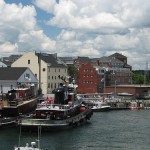After A Tenuous Year, N.H. Fishery Receives Disaster Declaration
This story was written and produced for broadcast by Sam Evans-Brown, and edited for StateImpact New Hampshire by Emily Corwin. Hear the original broadcast.
It’s been a difficult year for New Hampshire fishermen. Although fishermen have stayed within their catch limits, stocks of codfish haven’t rebounded from a decade-old collapse as quickly as expected.
Facing cuts and closures imposed by regulators, New Hampshire fishermen say the government is putting them out of business. And Thursday, the government heard their call.
The federal government declared a disaster in the Northeast Multispecies Groundfish Fishery, which could mean relief for struggling fishermen.
Scientists are uncertain whether it is warmer oceans affecting maturation, too many predators, or something else entirely that has prevented the cod population from rebounding. Whatever the cause, fishermen will face an 80 percent cut in the number of cod they are allowed to land next year.
Carl Bouchard is a fisherman from Rye. Before the federal disaster was announced, Bouchard addressed regulators and a crowd of fishermen in Portsmouth, arguing that the people who set the catch limits don’t have to live with the results. “Those people still got their jobs, most of them have got a good retirement plan, some of them even got a raise,” he said to a cheering crowd. “Who’s accountable? The fishermen are the only ones who are held accountable for something they didn’t do!”
The fishermen expressed a feeling of being punished for things beyond their control. Gill-net fisherman Jay Driscoll’s hands shook as he handed three devices called pingers to NOAA administrator Bullard. Fishermen are required to hang pingers on their nets to keep harbor porpoises from getting caught in them. “Two of these pingers are working, one isn’t. Maybe you could tell me which one because you’re a very educated man.” Neither the regulator, nor the fishermen could tell — which might be why too many porpoises have wound up in their nets. And because of the porpoises, NOAA is shutting down the Gill-net fishery for October and November, the two most profitable months of the year.
Driscoll says this closure means he won’t be able to make his mortgage payments. “I have no problem with NOAA coming down and making sure I am compliant with every one of these things that goes on my net. I’d rather you throw me in jail than have this kind of closure put on me right now.”
As of 2011, there were only 52 active ground-fishing boats left in New Hampshire — the fleet has been losing about five boats a year since 2007. The fishermen who are left say that the quota cuts and closures could be the final nail in the coffin of the New Hampshire fishing fleet.
That’s why, during the last ten months, the governors of six Northeastern states have been asking Congress for $100 million in disaster relief funds.
And just this week, the feds have granted that declaration. Unlike a FEMA disaster declaration, there is no pot of money already waiting for a failed fishery. Instead, it’s up to the New England delegation to help Congress find those dollars. And after that one-time shot of money is spent, the question becomes: will Granite State Ground fishermen be able to hang on?
NOAA administrator John Bullard says that all depends on rebuilding fish stocks. “Fish and fisherman. Every day we’ve got to have fish and fisherman. That’s the way I look at it. Any day we wake up and we don’t have fish and fisherman, you know it’s time to go home.”


